(完整版)初中英语情态动词专项练习题
九年级人教版完整版(完整版)英语情态动词专题(练习题含答案)及解析

九年级人教版完整版(完整版)英语情态动词专题(练习题含答案)及解析一、选择题1.– Would you like me to lock the door?– _______A.Yes, I’d like to.B.It’s a pleasure.C.Yes, please. D.It doesn’t matter. 2.—Are you going to offer some masks and alcohol wet wipes (酒精湿巾) to the people in the village?—________ They are in great need of these things.A.What a shame! B.Why not? C.Why me? D.What's wrong? 3.—Can I look at the menu for a few more minutes before I decide?—Of course. ________, Sir.A.Make yourself at home B.Enjoy yourself C.It doesn’t m atterD.Take your time4.—Liz, I’d like to take a week’s holiday.—________. We’re as busy as a bee.A.Go ahead B.With pleasure C.Forget it D.That’s right 5.—The game is too hard for me. I will certainly lose.—________. You should never say no before you try.A.Forget it! B.Come on! C.I’m sorry.D.Pardon me? 6.—Here’s your change.—________A.My pleasure. B.Thank you. C.With pleasure. D.No problem. 7.—Our family will go to Hangzhou for a holiday this summer.—________.A.Well done B.I am glad to hear thatC.Best wishes to you D.Have fun8.—I plan to find a part-time job in the coming summer holiday.—________ It will be a totally different experience.A.See you later. B.You’d better not.C.I’m sorry to know that.D.That sounds like fun.9.—I was too busy to see the singing competition.—________. I have to say it’s really wonderful.A.No problem B.You are welcome C.Not at all D.It’s a pity 10.—I’m afraid I can’t get good grades in the P.E. exam.—________! Train as much as you can.A.Well done B.Keep trying C.Enjoy yourself D.Be careful 11.—________.—It’s a pleasure.A.Don’t worry about the task B.Thank you for showing me aroundC.Be careful when you travel D.You’d better get up now12.— The dress I got is not the same color as that is shown online.—________? But if so, I promise we will send you another one.A.How come B.Who knows C.What for D.Why worry 13.—It's a shame to ask you to lend me more money, but. . .— ______ . You really need money to keep on with your education.A.Don't be silly B.Forget it C.No way D.Don't mention it 14.— The movie Lost in Russia sends a message about the importance of family.— ________. It reminds me of my parents.A.I hope so B.That’s all right C.You bet D.I don’t think so 15.—Amazingly, I've managed to finish the project by myself.—___________I told you it was easyA.With pleasure. B.Guess what? C.There you are! D.It doesn’t matter 16.—It’s been a wonderful party. Thank you very much?—- ________________.A.With pleasure B.No , thanks C.It’s OK D.I’m glad you enjoyed it .17.-Do you think the rain will stop tomorrow?-_____. It has rained for four days. It’s too wet everywhere.A.I hope not B.I don’t think soC.Don’t worry D.I hope so18.— What do you think of the movie Mr. Bea ?—____. It’s very funny.A.I can’t stand it . B.I don’t mind it C.I love it. D.I hate it. 19.—Would you like a small or a large bowl of noodles? —_______. I’m very hungry.A.A small bowl B.A large bowl C.Yes, please D.No, thanks 20.-Do you mind telling me how to use this function? - . It’s easy. Just double-click on the “Pencil” icon.A.No, not at all B.Of course, I doC.Yes, I do D.Yes, I don’t21.—Lucy, can you help me with my history?—________. I am good at it.A.With pleasure B.I’m afraid not C.Sorry, I can’t D.No way 22.— Shall we go to Nanjing Green Expo Park to enjoy the beautiful flowers this afternoon?—________. Let’s go there by bike.A.I think so B.That’s all right C.My pleasure D.Sounds great 23.—I’m sorry I didn’t make it to your birthday party last night.— ________ I know you are busy recently.A.Why not? B.Don’t mention it.C.No way. D.That’s all right. 24.—Susan, will you please go and empty that drawer?— _________ ?A.What for B.What is it C.How is it D.How come 25.—I’m afraid I can’t do well in the sports meeting. I mi ght let my classmates down.—_______. You don’t need to push yourself too hard.A.It’s a pleasure B.What a pity C.Take it easy D.You’re welcome 26.—How about buying that coat?—________. It’s too expensive. I can’t afford it.A.That sounds good B.No way C.Good idea D.What a pity 27.—Could you help me look after my baby ________ I am away?—________.A.as; With pleasure B.while; My pleasure C.as; That’s all right D.while; With pleasure28.—How would you like your soup?—________.A.Very delicious B.With some tomatoes and eggs, please C.I like it very much D.No, thanks29.—Time is up. I have to go now.—________ ! We don’t have more time to talk.A.That’s cool B.That’s the answer C.That’s a pity D.That’s good news 30.—Would you mind if I open the window?—_______.We need fresh air.A.Not at all B.Yes, of course C.You’d better not D.That’s all right 31.—Only those who have a lot in common can get along well.—________. Opposites sometimes attract.A.I think so B.I don’t think so C.I don’t care D.I hope so 32.—Shall we go to the amusement park right away or the day after tomorrow?—________. Any time will do.A.Excuse me B.Have a good timeC.It’s up to you D.I’m afraid I can’t33.—How do you like coffee, Minnie?—It tastes very terrible. ________.A.I have no idea B.I don’t mind it C.I really can’t stand it D.I can’t afford it 34.—He is too short to be a successful basketball player.—________ Every dog has its day.A.I think so. B.It’s hard to say.C.That’s right.D.You’d better not. 35.— May I have a look at the newspaper China Daily?— Certainly. ________A.Thank you. B.It’s a pity.C.Here you are. D.I’d like to. 36.—I love the Internet. I’ve come to know many friends on the net.—________. Few of them would become your real friends.A.I can’t agree more B.I’m pleased to know thatC.That’s for sure D.That’s not the case37.—Another Friday! Let’s go to see the play tonight.—________ I will book the tickets online.A.My pleasure. B.That’s right.C.Why not? D.Never mind. 38.—________!—Yes. It sounds gentle and relaxing.A.How good the vegetable soup is B.How exciting the storybook isC.What nice music Ann is playing D.What a beautiful flower Jim keeps 39.—All of Mark Twain’s novels are popular.— ________. Especially The Adventures of Tom Sawyer.A.I can’t agree more B.That’s not the case C.That’s not the point D.Don’t mention it 40.—I wonder if Tenny is doing well in her new school.—________. She is old enough to look after herself well.A.You’re welcome B.Good luck C.It’s a pity D.No need to worry 41.—Many people think women are better at cooking than men.—________. Most top chefs in the world are men.A.I agree B.I can’t agree more C.Not at all D.That’s not the case 42.— Wow, what a good smell! Can I have a piece of cake?— ________A.No way. B.Good idea! C.HeIp yourself. D.What a pity! 43.—Summer camping gives children the chance to live away from home.—________. It is always good to help children grow up.A.That’s true.B.Come this way. C.Let me have a look. D.I don’t think we agree.44.—Thank you for helping to build hospitals during this special period.— ________ ! Many hands make light work.A.My pleasure B.All right C.Never mind D.None of my business45.—I prefer to chat online. I’ve got to know many friends on the Internet.—________. Few of them would become your real friends.A.I can’t agree more B.I’m pleased to know thatC.That’s for sure D.That’s not the case46.—Do you think you could finish this project without help?—________. This is not the first time for me.A.Take care B.Don’t worry C.Not exactly D.Hurry up 47.—We can invite Kate and Paul to Baohe Park with us.—________ I’ll give them a call right now.A.Why not? B.What for? C.What’s up?D.Are you kidding? 48.—Mum, Joe has broken a cup!—________. Accidents always happen.A.Pretty good B.Of course C.It doesn’t matter D.That depends 49.—We’ll study in different schools next term. I hope you’ll enjoy your time in the new school!—________A.I’ll take your advice. B.The same to you. C.Congratulations!D.It doesn’t matter.50.— Mike, are you ready for the coming final exam?— ________. I have prepared it for weeks.A.You bet B.No deal C.Bad luck D.Have fun【参考答案】***试卷处理标记,请不要删除一、选择题1.C【详解】句意:——要我锁门吗?——是的。
初中英语情态动词专项练习
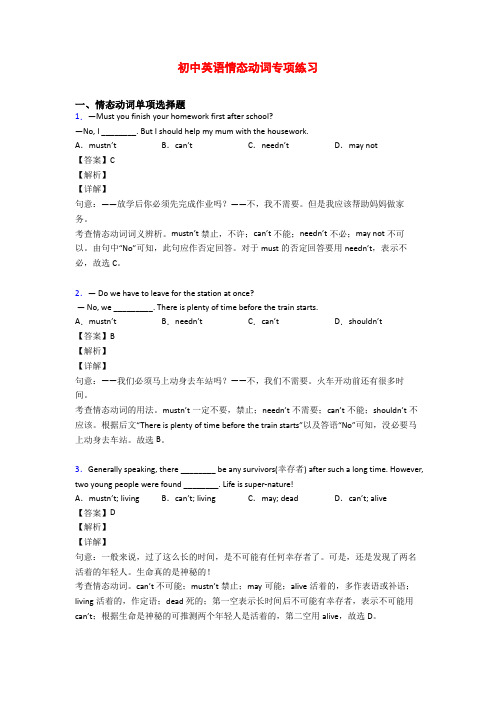
初中英语情态动词专项练习一、情态动词单项选择题1.—Must you finish your homework first after school?—No, I ________. But I should help my mum with the housework.A.mustn’t B.can’t C.needn’t D.may not【答案】C【解析】【详解】句意:——放学后你必须先完成作业吗?——不,我不需要。
但是我应该帮助妈妈做家务。
考查情态动词词义辨析。
mustn’t禁止,不许;can’t不能;needn’t不必;may not不可以。
由句中“No”可知,此句应作否定回答。
对于must的否定回答要用needn’t,表示不必,故选C。
2.— Do we have to leave for the station at once?— No, we _________. There is plenty of time before the train starts.A.mustn’t B.needn’t C.can’t D.shouldn’t【答案】B【解析】【详解】句意:——我们必须马上动身去车站吗?——不,我们不需要。
火车开动前还有很多时间。
考查情态动词的用法。
mustn’t一定不要,禁止;needn’t不需要;can’t不能;shouldn’t不应该。
根据后文“There is plenty of time before the train starts”以及答语“No”可知,没必要马上动身去车站。
故选B。
3.Generally speaking, there ________ be any survivors(幸存者) after such a long time. However, two young people were found ________. Life is super-nature!A.mustn’t; living B.can’t; living C.may; dead D.can’t; alive【答案】D【解析】【详解】句意:一般来说,过了这么长的时间,是不可能有任何幸存者了。
初中英语语法专项练习-情态动词
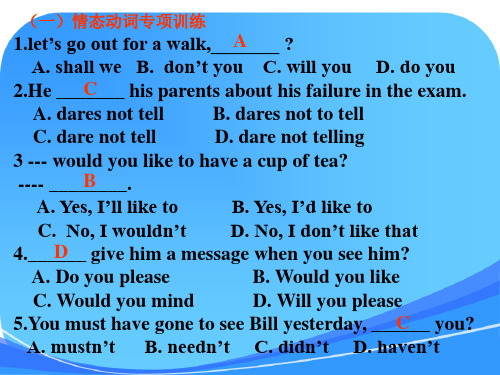
---- ______ Of course, please.And I’d rather he ______
me the truth.
A. Will;inform
C. dare not tell
D. dare not telling
3 --- would you like to have a cup of tea? ---- ____B____.
A. Yes, I’ll like to
B. Yes, I’d like to
C. No, I wouldn’t D. No, I don’t like that
A. be, should have been B. am, should be
C.should be, be D. have been, should have been 7.___C___ out of season, I would have ordered some from
the fruit stand.
(一)情态动词专项训练
1.let’s go out for a walk,___A____ ?
A. shall we B. don’t you C. will you D. do you
2.He ___C____ his parents about his failure in the exam.
A. dares not tell B. dares not to tell
A. If oranges would have been
B. If oranges have not been
C.Had oranges not been
D.Should oranges not have been
初中英语情态动词专项练习(附答案解析)
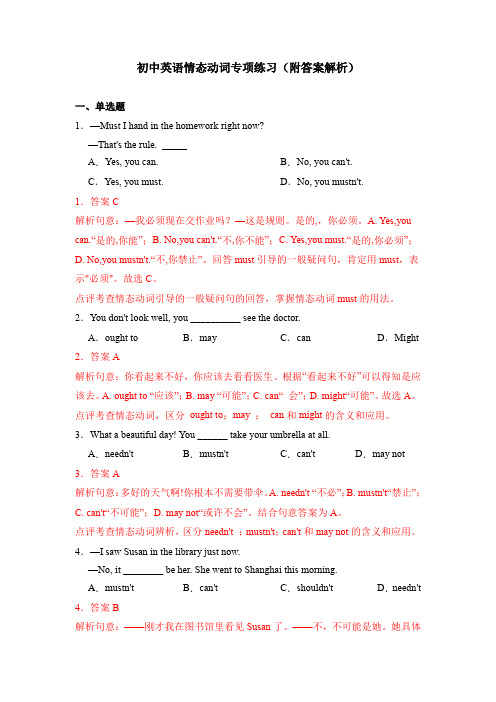
初中英语情态动词专项练习(附答案解析)一、单选题1.—Must I hand in the homework right now?—That's the rule.A.Yes, you can.B.No, you can't.C.Yes, you must.D.No, you mustn't.1.答案C解析句意:—我必须现在交作业吗?—这是规则。
是的,,你必须。
A. Yes,you can.“是的,你能”;B. No,you can't.“不,你不能”;C. Yes,you must.“是的,你必须”;D. No,you mustn't.“不,你禁止”。
回答must引导的一般疑问句,肯定用must,表示"必须"。
故选C。
点评考查情态动词引导的一般疑问句的回答,掌握情态动词must的用法。
2.You don't look well, you __________ see the doctor.A.ought to B.may C.can D.Might 2.答案A解析句意:你看起来不好,你应该去看看医生。
根据“看起来不好”可以得知是应该去。
A. ought to “应该”;B. may “可能”;C. can“ 会”;D. might“可能”。
故选A。
点评考查情态动词,区分ought to;may ;can和might的含义和应用。
3.What a beautiful day! You ______ take your umbrella at all.A.needn't B.mustn't C.can't D.may not 3.答案A解析句意:多好的天气啊!你根本不需要带伞。
A. needn't “不必”;B. mustn't“禁止”;C. can't“不可能”;D. may not“或许不会”。
初中英语情态动词专项训练题
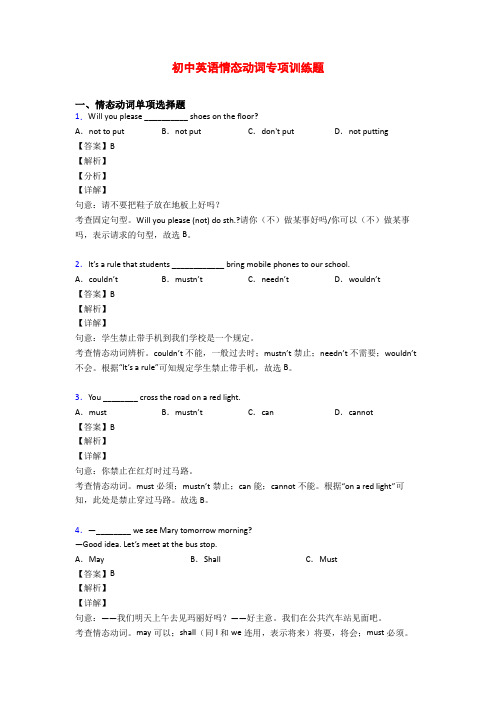
初中英语情态动词专项训练题一、情态动词单项选择题1.Will you please __________ shoes on the floor?A.not to put B.not put C.don't put D.not putting【答案】B【解析】【分析】【详解】句意:请不要把鞋子放在地板上好吗?考查固定句型。
Will you please (not) do sth.?请你(不)做某事好吗/你可以(不)做某事吗,表示请求的句型,故选B。
2.It’s a rule tha t students ____________ bring mobile phones to our school.A.couldn’t B.mustn’t C.needn’t D.wouldn’t【答案】B【解析】【详解】句意:学生禁止带手机到我们学校是一个规定。
考查情态动词辨析。
couldn’t不能,一般过去时;mustn’t禁止;needn’t不需要;wouldn’t 不会。
根据“It’s a rule”可知规定学生禁止带手机,故选B。
3.You ________ cross the road on a red light.A.must B.mustn’t C.can D.cannot【答案】B【解析】【详解】句意:你禁止在红灯时过马路。
考查情态动词。
must必须;mustn’t禁止;can能;cannot不能。
根据“on a red light”可知,此处是禁止穿过马路。
故选B。
4.—________ we see Mary tomorrow morning?—Good idea. Let’s meet at the bus stop.A.May B.Shall C.Must【答案】B【解析】【详解】句意:——我们明天上午去见玛丽好吗?——好主意。
我们在公共汽车站见面吧。
考查情态动词。
may可以;shall(同I和we连用,表示将来)将要,将会;must必须。
(完整版)初中英语情态动词练习题及答案

( )1 John come to see us tonight, but he isn't very sure yet. A. may B. can C. has to D. Must2 They do well in the exam.A. can be able toB. be able toC. can able toD. are able to3 — May I take this book out? — No, you. A. can't B. may not C. needn't D. aren't4 You go and see a doctor at once because you're got a fever. A. can B. must C. dare D. would5 — Can youspeak Japanese?—No, I.A. mustn'tB. can'tC. needn'tD. may not1. — He be in the classroom, I think — No, he be in the classroom. I saw him go home a minute ago. A. can; may not B. must; may not C. may; can't D. may; mustn't2 — Shall I get one more cake for you, Dad? A. may not B. must not C. can't D. needn't very difficult.A. mayB. mustC. canD. need4 He isn't at school. I think he ___ be ill.A. canB. shallC. mustD. has to5 ___ I take this one?A. MayB. WillC. AreD. Do1 The children play football on the road.A. can'tB. canC. mustn'tD. must2 You ___ be late for school again next time.A. mustn'tB. needn'tC. don't have toD. don't need to3 — Must I do my homework at once? — No, you___.A. needn't B. mustn't C. can'tright. He go and see the doctor.C. haven't toD. doesn't have to2 He had to give up the plan,he?A. didB. didn'tC. doesD. doesn't 3 They had to walk here,they?— Thanks, but you___, I've had enough.3 Even the top students in our class can't work out this problem, so it be D. may not 1 His arm is all A. has not to B. don't have toA. mustn'tB. didC. didn'tD. hadn't1 He had better stay here,he?A. doesn'tB. don'tC. hadn'tD. isn't2 You'd better late next time.A. not to beB. not beC. won't beD. don't be3 You'd better your hair once a month.A. had; cutB. had; cuttedC. have; cutD. have; cutted4 You ask that man over there. Maybe he knows the way. A. had better not to B. had not better C. had better D.had better not1 — Shall we go and visit the History Museum next Sunday? —A. Here you areB. Sorry, I can'tC. Yes, pleaseD. Let me try2 — Why don't you ask Mike to go with us? — Thanks,.A. I willB. I won'tC. leanD. I may 3 —I take the newspaper away? — No, you mustn't. You read it onhere.A. Must; canB. May; canC. Need; mustD. Must; must1 Excuse me.you please pass me that cup?A. DoB. ShouldC. WouldD. Must2 you like to have another try?A. CouldB. WillC. WouldD. Do3 — Would you like to go boating with us? — Yes,. A. I'd like B. I want C. I'd like to D. I do 1 You worryabout your son. He will get well soon. A. needn't B. can't C. mustn't D. have to 2 The poor man needs our help, he?A. needB. needn'tC. doesD. doesn't3 — Must we do our homework first? — No, you. You may have a rest first.A. mustn'tB. needn'tC. may notD. can'tI. I told Sally how to get here, but perhaps I for her.A. had to write it outB. must have written it outC. should have written it outD. ought to write it out 2.——There were already five people inthe car but they managed to take me as well. — It a comfortable journey.A. can ' t beB. shouldn ' t beC. mustn ' t have beenD. couldn ' t have been 3. It ' s nearly seven o ' clock. Jack be here at any moment.A. mustB. NeedC. shouldD. can4. Johnny, you play with the knife, you hurt yourself.A. won ' t; can ' tB. mustn ' t; mayC.shouldn ' t; mustD. can ' t; shouldn ' t5. The fire spread through the hotel very quickly but everyone get out.A. had toB. wouldC. couldD. was able to6. — When can I come for the photos? I need them tomorrow afternoon. — They be ready by 12:00.A. canB. shouldC. mightD. need7. — I stayed at a hotel while in New York.— Oh, did y ou? You with Barbara.A. could have stayedB. could stayC. would stayD. must have stayed8. — Are you coming to Jeff ' s party?m not sure. I go to the concert instead.A. mustB. wouldC. shouldD. might9. I was really anxious about you. You home without a word.A. mustn ' t leaveB. shouldn ' t have lefC. couldn ' t have leftD. needn ' t leave10. — Is John coming by train? — He should, but he not. He likes driving his car.A. mustB. canC. needD. mayII. A left-luggage office is a place where bags be left for a short time, especially at a railway station.A. shouldB. canC. mustD. will12. I wonder how he that to the teacher.A. dare to sayB. dare sayingC. not dare sayD. dared say13. When he was there, he go to that coffee shop at the corner after work every day.A. wouldB. shouldC. had betterD. might14. It has been announced that candidates remain in their seats until all the papers have been collected. A. canB. willC. mayD. shall15. How ou say that you really understand the whole story if you have covered only a part of the article? A. canB. mustC. needD. may 16. — I hear you' vgot a set of valuable Australian coin.I have a look? — Yes,certainly.A. DoB. MayC. ShallD. Should【巧学活用参考答案】 1. 1-5 A D A B B 2. 1-5 C D B C A 3. 1-3 C A A 4. 1-3 D B C 5. 1-4 C B C C 6. 1-3 B A B 7. 1-3C C C 8. 1-3 AD B情态动词练习参考答案 1. G — ought to / should have+过去分词II表示后悔当初该做但却没做某事。
(完整版)情态动词专项练习(含答案)
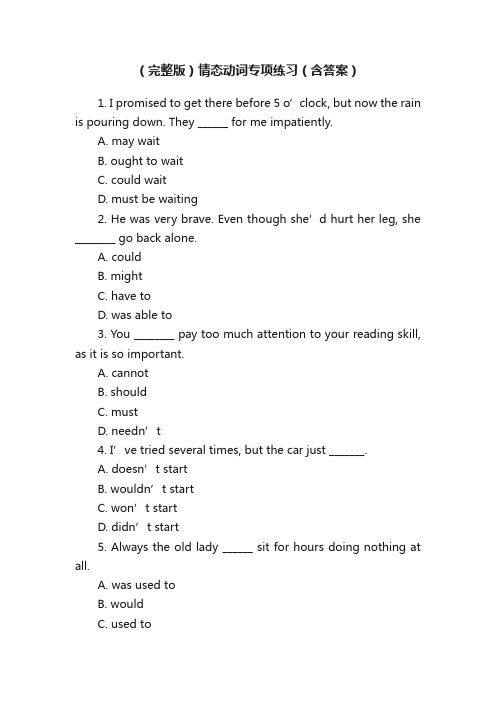
(完整版)情态动词专项练习(含答案)1. I promised to get there before 5 o’clock, but now the rain is pouring down. They ______ for me impatiently.A. may waitB. ought to waitC. could waitD. must be waiting2. He was very brave. Even though she’d hurt her leg, she ________ go back alone.A. couldB. mightC. have toD. was able to3. You ________ pay too much attention to your reading skill, as it is so important.A. cannotB. shouldC. mustD. needn’t4. I’ve tried several times, but the car just _______.A. doesn’t startB. wouldn’t startC. won’t startD. didn’t start5. Always the old lady ______ sit for hours doing nothing at all.A. was used toB. wouldC. used toD. should6. There used to be a small school,___________?A. was thereB. wasn’t itC. usedn’t thereD. usedn’t it7. Our house is on the top of the hill, so in summer the wind _____ be pretty cold.A. mustB. canC. ought toD. need8. Haven’t I told you that you __________ have the ans wer tomorrow morning?A. willB. shallC. shouldD. would9. I’m surprised that he _______ in the match.A. should failB. should have failedC. would have failedD. may have failed10. Better go to see my sick colleague right now, ________I?A. hadn’tB. didn’tC. don’tD. won’t11. Sir, you ______ be hunting deer here, for they are preserved by the government.A. oughtn’t toB. can’tC. won’tD. needn’t12. Sorry I’m late. I ______ have turned off the alarm clock and gone back to sleep again.A. mightB. shouldC. canD. will13. —There were already five people in the car, but they managed to take me as well.— It __________ a comfortable journey.A. can’tB. shouldn’t beC. must have beenD. couldn’t have been14. To be on the safe side, we should fill up the tank now, because we ______ run out of gas on the way.A. canB. wouldC. mightD. should15. ____ three people who travel together, there _____ be at least one who ____ be my teacher.A. Between; can; willB. In; should; couldC. Among; will; mayD. Of; must; can16. —Could you lend me that book you ______ me aboutwhen I telephoned you?—No, I am sorry, I can’t. I gave it to a friend.A. were tellingB. would tellC. had toldD. had been telling17. —We need a person badly to think up such an idea.—_______ the new comer have a try?A. ShallB. MayC. ShouldD. Need18. We ________ so tired. We’ve only been to a party.A. mustn’t have feltB. wouldn’t have feltC. shouldn’t have feltD. couldn’t have felt19. Professor Smith, many students want to see you. __________ they wait here or outside?A. DoB. ShallC. WillD. Would20. —How about paying a visit to Mr. Richardson, our former history teacher?—Good idea. I will e-mail him today so he _____know _________ to expect us.A. shall; whyB. may; whenC. would; whyD. will; how21. —I went to work on foot yesterday, though it _________ cats and dogs.—You __________ by bus. It was likely to get a cold.A. is raining; must have goneB. rained; would goC. was mining; should have goneD. have rained; could have gone22. You ______ pay too much attention to your reading skill, as it is so important.A. cannotB. shouldC. mustD. needn’t23. I told Sally to fix him up with this job, but perhaps I _________ it out for her.A. had to writeB. must have writtenC. should have writtenD. ought to write24. My sister met him at the Grand Theatre yesterday afternoon, so he ________ your lecture.A. couldn’t have attendedB. needn’t have attendedC. mustn’t have attendedD. shouldn’t have attended25. Research findings show we spend about two hours dreaming every night, no matter what we ________ during the day.A. should have doneB. would have doneC. may have doneD. must have done26. —Is there any flight to Tokyo today?— I think there _____, for the weather is too bad.A. mustn’t beB. mightn’t beC. needn’t beD. can’t be27. —I’m told that John had another car accident this morning.— I believe not. He _____ so careless.A. shouldn’t have beenB. wouldn’t have beenC. couldn’t have beenD. mustn’t have be en28. It was playing computer games that cost the boy a lot of time that he __________ doing his lessons.A. might have spentB. ought to have spentC. must have spentD. could have spent29. —I didn’t know you were good friends.—You _______. I have known her since she moved here. You were studying abroad then.A. may haveB. needn’t haveC. couldn’t haveD. must have30. They must have finished the work by the end of last month, __________?A. mustn’t theyB. haven’t theyC. hadn’t theyD. didn’t they31. —I didn’t see her yesterday.— Of course, you _____, because he had gone for a trip.A. can’tB. may not haveC. can’t haveD. mustn’t have32. You ________ phone him if you want to, but you _________. He is sure to phone you.A. may; mustn’tB. have t o; needn’tC. can; doesn’t needD. can; needn’t33. — She must have gone back to the valley.— ______, she _____ have. The entrance to it was nowhere to be found.A. No; mustn’tB. Yes; mightC. Yes; couldD. No; couldn’t34. He _____ full marks, but he was so careless as to make a spelling mistake.A. must have gainedB. can have gainedC. could have gainedD. must gain35. From what you said, she _____ you about it.A. mustn’t have toldB. can’t have toldC. mustn’t tellD. can’t tell36. — You ought to have made an apology to Tom yesterday evening.— Yes, I know I _________.A. ought toB. have toC. should haveD. must have37. —Is there a fog in the evening?—There _______ be. I’ll make a phone call to find it out.A. mustB. wouldC. willD. might38. — _______ he help you with the problem?—Well, though it is very hard, __________ I’ll do what I can to work it out.A. Shall; butB. Can; andC. Must; howeverD. Will; still39. —How is that, Joan?—Yeah, it’s from the boss. She _________ first, whether she likes it.A. shall goB. ought to have goneC. should goD. must have gone40. —Would you like to watch the video, in which you can see foreigners making jiaoji during the Spring Festival?—Sure, it ______ be very interesting.A. shouldB. mayC. canD. will41. —The door was open.—It _________ open. I had locked it myself and the key was in my pocket.A. can not beB. must not beC. can not have beenD. must not have been42. —Where ________ Margaret have put the empty bottles?—She ________ them away. They must be somewhere.A. can; can’t have thrownB. must; needn’tC. must; must have thrownD. cant; must throw43. —Mum, I climbed to get the Teddy Bear from the top of the shelf.—My goodness! You _______ yourself. You ______ do that next time.A. mu st have hurt; mustn’tB. should have hurt; can’tC. may have hurt; mustn’tD. might have hurt; won’t be able to44. —Shall I go and buy more food and drinks for the party?—No, we have prepared a fridge of those. That _______ be quite enough.A. canB. mayC. mightD. ought to45. —Hurry up, Michael! It’s ten to three.—Goodness me! The class_______. I’ll be late again.A. must beginB. may beginC. should have begunD. must have begun46. When he was there, he ____ go to that coffee shop at the street comer after work every day.A. wouldB. shouldC. had betterD. might47. —I hear you have written a novel.—Yes, the book ________ be out in a month or so.A. canB. dareC. shouldD. need48. —How could I thank you enough?—Don’t mention it. Any other man _________ that.A. must doB. could doC. would have doneD. should have done49. —Why aren’t they here yet?—They ________ the bus.A. can have missedB. must be late forC. may have missedD. might be late for50. Mike _______ come to see me I don’t want to go out in case he comes.A. canB. mustC. mayD. will51. The thief ________ in from the kitchen window as the door was closed.A. may climbB. must have climbedC. could have climbedD. should have climbed52. —You didn’t invite Bill?— __________ him too?A. Must I inviteB. Must I have invitedC. Should I inviteD. Should I have invited53. —Why didn’t you attend the lecture yesterday?—I didn’t think that we _______ on Sundays.A. shouldB. ought to haveC. shouldn’t haveD. will have to54. It’s said that there are plenty of hotels in that town. There ______ be any difficulty for you to find somewhere to stay.A. wouldn’tB. mustn’tC. shouldn’tD. needn’t55. —Would you be here to attend the English party this evening?—Yes, we _________.A. shallB. wouldC. willD. must56. On Sundays when I was a child, Father and I _______ get up early and go fishing.A. couldB. wouldC. mightD. should57. —You’d better keep quiet in class.—Sometimes I ________ Yesterday, I was very quiet during my English class.A. wouldB. doC. didD. have58. I lived with my sister this summer and didn’t have to pay rent. So I ______ save most of my salary.A. couldB. wouldC. was able toD. should59. —Look, John’s fallen asleep.— Oh, he _______ too late last night.A. might sit upB. should have sat upC. could sit upD. must have sat up60. —I posted the letter a week ago.—Then they __________ the letter by now. It usually takes four days.A. can have receivedB. must receiveC. should receiveD. ought to have received61. He used to teach in that university and I _________ ride past it on my way to work.A. wouldB. couldC. shouldD. might62. —So you have to leave now.—Yes, I __________.—How nice it would be if you could stay a bit longer!A. have toB. ought toC. doD. have63. He _______ Shanghai, for I saw him talking with the headmaster a moment ago.A. must have gone toB. can’t have gone toC. mustn’t have been toD. can’t have been to64. From what I learn about their hotel, the service and the weather, they _____ their holiday very much.A. wouldn’t have enjoyedB. shouldn’t have enjoyedC. needn’t have enjoyedD. can’t have enjoyed65. It is not like Jack to be unfriendly, so he _________ you when you called.A. can’t have seenB. should not have seenC. must not have seenD. need not have seen66. —Many people in England love to give advice on weather reporting.—Yes, but I think the weather office’s computers _________ be more accurate.A. canB. mustC. ought toD. might67. —The farmers lived near the high way.—________ very noisy.A. It must have beenB. They must beC. That might beD. There must be68. She is too slow. She ________ pass the test, but she __________ too little.A. would; knewB. will; knowsC. would; knowsD. will; knew69. —Mary didn’t turn up last time, did she?—No. She_________. We had changed our plan.A. shouldn’t have comeB. needn’t have to comeC. didn’t need to comeD. needn’t have come70. —They haven’t finished the work up to now.—Well, they________.A. shouldB. should haveC. wouldD. must have71. —Shall I go and buy more fruit for the party?—No, I have already bought 3 baskets. That _________ be enough.A. canB. ought toC. mayD. might72. —Why hasn’t the speaker turned up?—He _________ the flight. I’ll find it out at once.A. must have missedB. might have missedC. would have missedD. could have missed73. I _______ pay Tom a visit, but I am not sure whether I will have time this Sunday.A. shouldB. mightC. wouldD. could74. —Who is the girl standing over there?— Well, if you _____ know, her name is Mabel.A. mayB. canC. mustD. shall75. It has been announced that candidates (考生)________ remain in their seats until all the papers have been collected.A. canB. willC. mayD. shall【答案解析】1.D。
初中英语情态动词专项练习
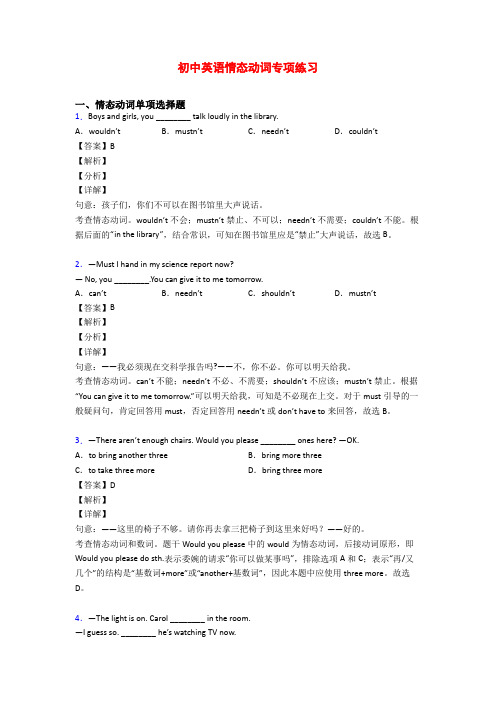
初中英语情态动词专项练习一、情态动词单项选择题1.Boys and girls, you ________ talk loudly in the library.A.wouldn’t B.mustn’t C.needn’t D.couldn’t【答案】B【解析】【分析】【详解】句意:孩子们,你们不可以在图书馆里大声说话。
考查情态动词。
wouldn’t不会;mustn’t禁止、不可以;needn’t不需要;couldn’t不能。
根据后面的“in the library”,结合常识,可知在图书馆里应是“禁止”大声说话,故选B。
2.—Must I hand in my science report now?— No, you ________.You can give it to me tomorrow.A.can’t B.needn’t C.shouldn’t D.mustn’t【答案】B【解析】【分析】【详解】句意:——我必须现在交科学报告吗?——不,你不必。
你可以明天给我。
考查情态动词。
can’t不能;needn’t不必、不需要;shouldn’t不应该;mustn’t禁止。
根据“You can give it to me tomorrow.”可以明天给我,可知是不必现在上交。
对于must引导的一般疑问句,肯定回答用must,否定回答用needn’t或don’t have to来回答,故选B。
3.—There aren’t enough chairs. Would you please ________ ones here? —OK.A.to bring another three B.bring more threeC.to take three more D.bring three more【答案】D【解析】【详解】句意:——这里的椅子不够。
请你再去拿三把椅子到这里来好吗?——好的。
考查情态动词和数词。
- 1、下载文档前请自行甄别文档内容的完整性,平台不提供额外的编辑、内容补充、找答案等附加服务。
- 2、"仅部分预览"的文档,不可在线预览部分如存在完整性等问题,可反馈申请退款(可完整预览的文档不适用该条件!)。
- 3、如文档侵犯您的权益,请联系客服反馈,我们会尽快为您处理(人工客服工作时间:9:00-18:30)。
初中英语情态动词专项练习题初中英语情态动词用法归纳情态动词有具体的词义,但也同助动词一样,需要与其他词语一起构成句子的谓语,另外情态动词没有人称和数的变化,情态动词后必须跟动词原形。
考点一:can,could, may,must 等情态动词的用法:1. can 的用法:(1).表示能力、许可、可能性。
表示能力时一般译为“能、会”,即有种能力,尤其是生来具备的能力,此时may 和must 均不可代替它。
如:She can swim fast, but I can’t . 她能游得很快,但我不能。
I can see with my eyes. 我用眼睛看。
(2).表示许可,常在口语中。
如:You can use my dictionary. 你可以用我的字典。
(3).表示推测,意为“可能”,常用于否定句和疑问句中,此时can’t 译为“ 不可能”。
如:Can the news be true? 这个消息会是真的吗?—Can it be our teacher?那个人有可能是我们老师吗?—No, it can’t be our teacher. He is on a visit to the Great Wall.不可能。
咱们老师正在游览长城呢。
【例题】—I think Miss Gao must be in the library. She said she would go there. —No. She __be there, I have just been there. A.can’t B.mustn’t C.needn’t D.wouldn’t【解析】根据下文“我刚去过那儿”可知,应为“ 不可能”,can’t 表示推测[答案] A2. could的用法:(1).can的过去式,意为“ 能、会”,表示过去的能力。
如:He could write poems when he was 10. 他十岁时就会写诗。
(2). could在疑问句中,表示委婉的语气,此时could 没有过去式的意思。
如:Could you do me a favour? 你能帮我个忙吗?—Could I use your pen? 我能用一下你的钢笔吗? —Yes, you can.可以。
(注意回答)3. may的用法:(1).表示请求、许可,比can 正式,如:May I borrow your bike? 我可以借你的自行车吗?You may go home now. 现在你可以回家了。
【例题】—_______ I borrow your MP3? —Sure . Here you are. A. May B.Should C.Must D. Would【解析】在此处表示请求,意为“ 做……可以吗”。
答案:A(2) .表示推测,谈论可能性,意为“ 可能,或许”,一般用于肯定句中。
如:It may rain tomorrow . 明天可能会下雨。
She may be at home. 她可能在家呢.(3) .may的过去式为might ,表示推测时。
可能性低于may。
如:He is away from school. He might be sick.他离开学校了,可能是他生病了。
(4) . 表示希望、祈求、祝愿,常可译为“祝愿”。
通常是用may +主+V 例如:May you have a good time. 祝你过得愉快。
May you be happy! 祝你幸福!May you succeed!祝你成功!4. must的用法:(1).must 表示主观看法,意为“必须、一定”。
如:You must stay here until I come back.在我回来之前你必须呆在这儿。
Must I hand in my homework right now? 我必须现在交作业吗?(2) 其否定形式mustn’t表示“ 一定不要” “千万别” “禁止, 不许”.如:You mustn’t play with fire. 你不许玩火。
You mustn’t be late. 你一定不要迟到。
(3)对must引导的疑问句,肯定回答为must,否定回答为needn’t 或don’t have to . 如:—Must I finish my homework?我现在必须完成作业吗?—No, you needn’t.不,你不必。
(4)must表示有把握的推测,用于肯定句。
如: The light is on, so he must be at home now.灯亮着,他现在肯定在家。
注意其反意问句的构成形式:当must表示肯定的判断、推测时,其反意疑问句要用实际问句的助动词来构成。
如:She must have seen the film before,hasn’t she?(注意反意疑问句的后半部分)You must have met uncle Wang in the shop yesterday,didn’t you? (注意反意疑问句的后半部分)5. need的用法:(1).need 表示需要、必须,主要用于否定句和疑问句中,其否定形式为needn’t,意为“没有必要,不必”。
用need 提问时,肯定回答为must,否定回答为needn’t或don’t have to。
如:—Need I stay here any longer? 我还有必要留在这儿吗?—Yes, you must .是的。
—No. you needn’t /don’t have to. 不,你不必。
(2).need 还可以作实义动词,此时有人称、数和时态的变化,如果是人作主语后边多接动词不定式。
如:I need to do it right now. 我需要马上做这件事。
He needs to learn more about the girl.他需要多了解那个女孩。
如果是物作主语,一般用need doing与need to be done这种情况下应注意两点:①.主动形式的动名词doing具有被动的含义;②.该动名词可以改为其动词不定式的被动形式而句子的意义不变。
例如:. The door needs painting. = The door needs to be painted. 那扇门需要油漆一下。
Your car needs mending. = Your car needs to be repaired. 你的车需要维修了。
6. dare 的用法:dare意为“敢、敢于”, 用法近似于need,有两种词性:(1)dare 作为情态动词,多用于否定句、疑问句或条件句中,无第三人称单数形式,只有一般现在时和一般过去时。
如:Dare he tell them what he knows? 他敢告诉他们所知道的情况吗?I daren’t ask her – will you do it for me? 我可不敢问她,你能帮我问问吗?(2)dare 作为实义动词,此时有人称、数及时态的变化。
如:He doesn’t dare to break his promise.他不敢食言。
注意:在口语中,dare 的各种形式常与不带to 的不定式连用。
如:Do you dare tell her what I said?你敢告诉她我说的话吗?I didn’t dare look at him.我不敢看他。
7. shall 的用法:shall表示征求对方意见(多用于第一、三人称),如:Shall we go out for a walk? 我们出去散步好吗?在英语中,我们可以用其他多种方式提出我们的建议或征求对方意见。
(1).用“Let's do...”来提出建议。
如:Let's go for a walk after supper.(2).用“What/How about...?”来提出建议;about后接名词或动词ing形式。
如:What about/How about a drink? What about/How about taking Tom with us?(3).用“Why not...?”来提出建议,表示“何不……”not面后接动词原形。
“Why not...?”实际上是“Why don't you/we...?”的简略形式。
如:Why not meet at the school gate at eight? Why don't we stay here another day?(4).用“Would you like...?”来提出建议,意思是“你想要……吗?”Would you like后可接名词或不定式。
如:Would you like a cup of tea?Would you like to go and see her?因此,如果我们说:“去游泳好吗?”英语中可有这样几种表达法:Shall we go for a swim?Let's go for a swim,shall we?What about/How about going swimming?Why not go for a swim? Would you like to go for a swim?What do you think of going for a swim?8. should的用法:(1).should 意为“应该” ,可表示劝告、建议、义务、责任等。
如:We should protect the environment. 我们应该保护环境。
(2)Should have done 表示对过去动作的责备、批评。
如:You should have finished your homework.你应该已经完成作业了。
(事实上你没有完成。
)9. will 的用法:will表示意愿、意志、打算,可用于多种人称。
如:I will help you if I’m free this afternoon.今天下午如果我有空,我就会帮你。
注意:1、will在there be句型中的形式及其句式变换。
由于“一般将来时”的结构可以用“will+动词原形”来表示,所以there be句型的一般将来时的形式就是there will be。
(一定不能说there will have)例如:There are many students in our school. →There will be many students in our school. There will be a sports meeting next week. 一定不能说:There will have a sports meeting next week.2、will 与be going to do sth区别:①. be going to 表示近期、眼下就要发生的事情,will 表示的将来时间则较远一些,如:He is going to write a letter tonight. He will write a book one day.②. be going to 表示根据主观判断将来肯定发生的事情,will表示客观上将来势必发生的事情。
